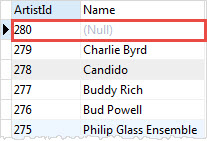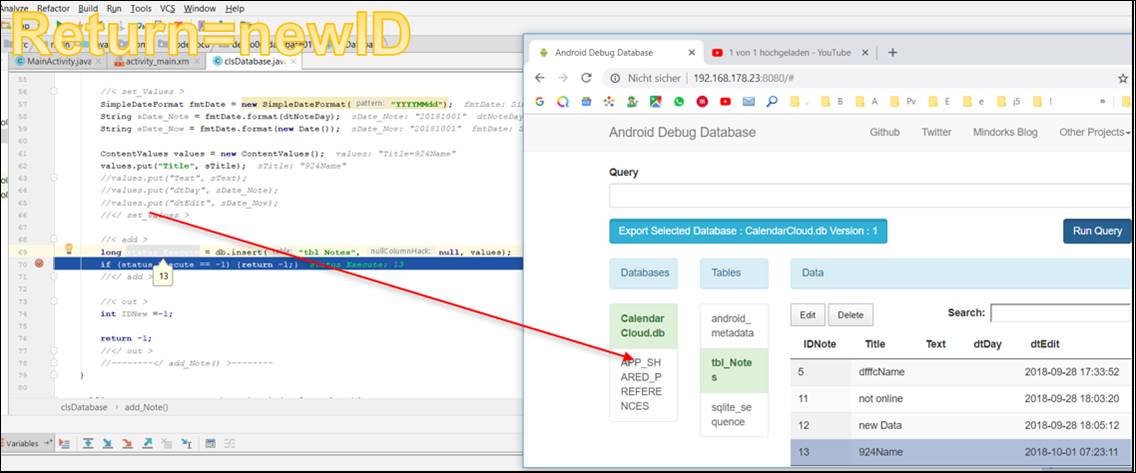

- #SQLITE INSERT ON CONFLICT HOW TO#
- #SQLITE INSERT ON CONFLICT UPDATE#
- #SQLITE INSERT ON CONFLICT CODE#
Now, you’re facing the dilemma of answering these questions accurately. They say yes, and you’re excited until they want to know when you last watched it and how many times you’ve watched it. Say you wanted to watch one of your favorite movies and ask your friend to join you. It allows you to to do everything you know and love with SQL – perform joins on tables, migrations, updates and much more.

SQLite is a variation of the SQL database language that allows you to save your data in a relational database and persist that data between app sessions. But as your data grows more complex and more interdependent, you’ll need to use a more formal data storage system, like SQLite. If the data is simple enough, you might be able to get away with using a key value storage system. Serial.You’ll often find that you need to save data in your Flutter applications between app launches.
#SQLITE INSERT ON CONFLICT UPDATE#
for: ON CONFLICT (mac_id) DO UPDATE set type=?

for:INSERT INTO test_table (mac_id,status,type) VALUES (?, ?, ?) for:UPDATE daily_temp_ap set status=? WHERE mac_id=? Sqlite3_exec(db1, "BEGIN TRANSACTION", NULL, NULL, &zErrMsg) Serial.printf("ERROR preparing sql: %s\n", sqlite3_errmsg(db1)) Rc = sqlite3_prepare_v2(db1, sql, strlen(sql), &res, &tail) "INSERT INTO test_table (mac_id,status,type) VALUES (?, ?, ?)" "INSERT INTO test_table (mac_id,sensor_type,status) VALUES (?, ?, ?) ON CONFLICT (mac_id) DO UPDATE set status=?" Rc = db_exec(db1, "CREATE TABLE IF NOT EXISTS test_table (mac_id DATETIME NOT NULL PRIMARY KEY UNIQUE, status INTEGER, type INTEGER)") ĭisplayPrompt("No. "CREATE TABLE IF NOT EXISTS test_table1 (mac_id INTEGER NOT NULL PRIMARY KEY, U1 INTEGER, U2 INTEGER, U3 INTEGER, U4 INTEGER, U5 INTEGER, U6 INTEGER, U7 INTEGER, U8 INTEGER, U9 INTEGER, U10 INTEGER)" "CREATE TABLE IF NOT EXISTS test_table (mac_id DATETIME NOT NULL PRIMARY KEY UNIQUE, status INTEGER, type INTEGER)" Serial.println(F("Failed to mount file Serial")) ĭisplayPrompt("No. Static int callback(void *data, int argc, char **argv, char **azColName) This example demonstrates how SQLite behavesĪt first it asks how much memory to occupyĬonst char* data = "Callback function called"
#SQLITE INSERT ON CONFLICT CODE#
This is the code I used for testing, based on the "bulk_data_insert" example: /* But now and than I will have to insert a new row.
#SQLITE INSERT ON CONFLICT HOW TO#
Has anyone a suggestion how to speed this up? I will mostly do updates. Any idea how I could improve this? I am still new to sqlite and c++ programming. I will only get 22 rows per second (I am not using any Indexes). However if I add "ON CONFLICT (mac_id) DO UPDATE set type=?": INSERT INTO test_table (mac_id,type,status) VALUES (?, ?, ?) ON CONFLICT (mac_id) DO UPDATE set status=? Or update more than 800 rows per second with: UPDATE test_table set status=? WHERE mac_id=? I can insert more than 800 rows per second in a database with: INSERT INTO test_table (mac_id,status,type) VALUES (?, ?, ?) I have used the "bulk_data_insert" example, adding "BEGIN TRANSACTION" / "END TANSACTION" and I am using a SPI SD card (WEMOS MINI D1 ESP32 with SD shield) instead of a SD MMC configuration.


 0 kommentar(er)
0 kommentar(er)
